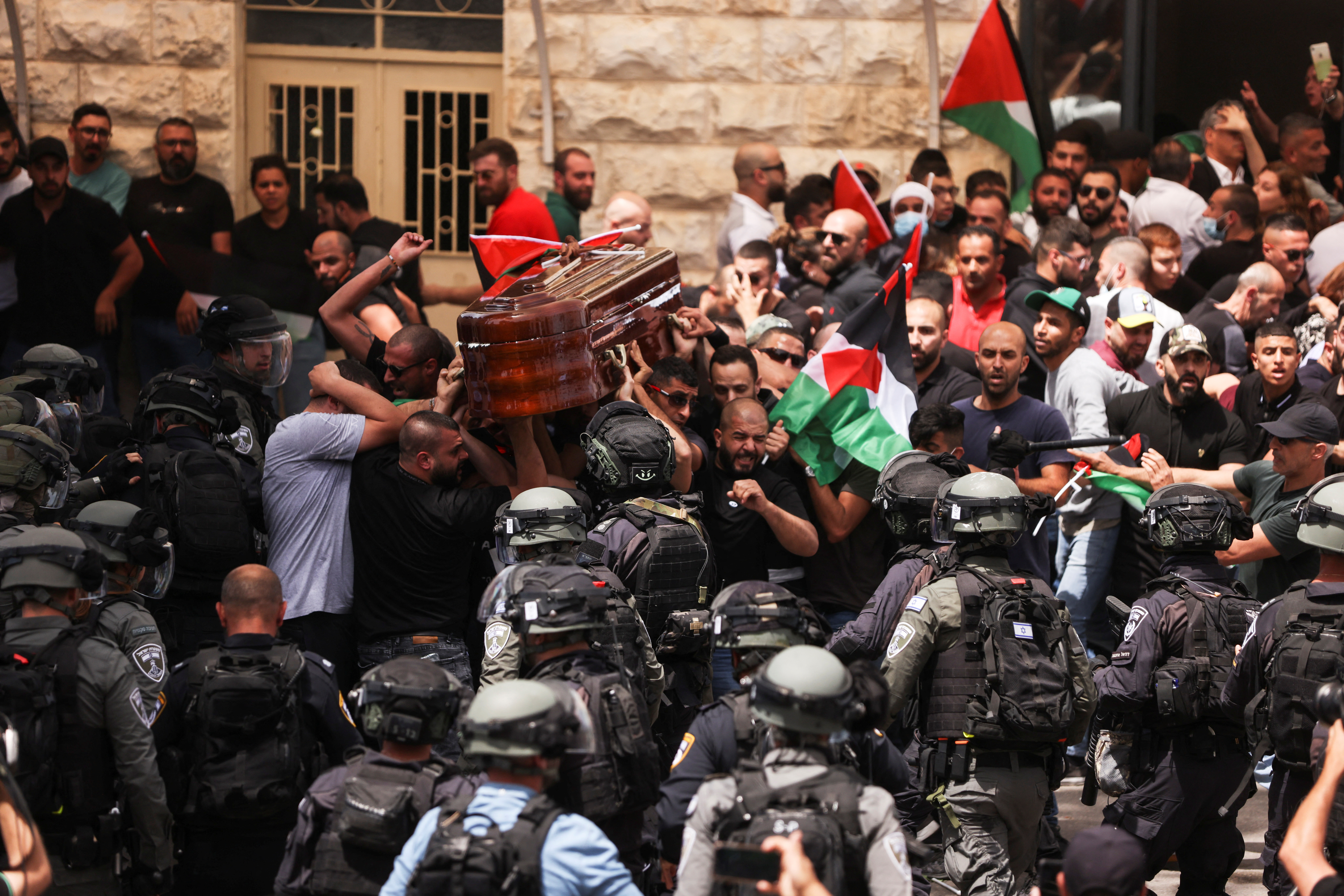
Scenes of horror and chaos briefly overshadowed the funeral of slain Al Jazeera journalist Shireen Abu Akleh when Israeli forces attacked mourners accompanying her coffin.
Dozens of Israeli police officers waded into the funeral procession beating, kicking and trying to prevent mourners from marching with the body of Abu Akleh, who was killed by Israeli gunfire on Wednesday, from a hospital in occupied East Jerusalem to a church service before her burial.
TV images showed police using batons to hit mourners as they struggled to hold up Abu Akleh’s coffin, which was draped with a Palestinian flag, causing the pallbearers to almost drop her coffin to the ground. The attack eventually forced the mourners to place Abu Akleh’s coffin in a hearse.
Local media quoted the Palestinian Red Crescent as saying at least 33 people suffered injuries as a result of the beatings. Three cases were taken to hospital for further treatment, it said.
A primary target of the Israeli police was the display of the Palestinian flag.
On the day Abu Akleh was killed, Israeli police entered her family home while her relatives were receiving condolences, and tore down a Palestinian flag. They also told mourners to turn off patriotic music.
On Thursday night, Abu Akleh’s brother was summoned by Israeli authorities and told to instruct mourners to not carry Palestinian flags or to recite Palestinian chants.
Al Jazeera reported that Israeli forces arrested at least four mourners, including two for raising the Palestinian flag, and had also smashed a window to remove a Palestinian flag from the hearse.
Palestinian flags were also removed from outside the church where Abu Akleh’s relatives were receiving condolences.
Many took to social media to express their outrage at the scenes that unfolded, with some Twitter users saying, “Even in mourning, Palestinians are not free from Israeli violence.”
The killing of the veteran journalist, who became a household name across the region, has sent shockwaves throughout the world and also focused new attention on why Israel is so fearful of a flag.
‘Even a flag is seen as a threat’
The very existence of the Palestinian flag threatens Israeli identity, said Marwa Fatafta, a policy member of the think-tank Al Shabaka.
“When a regime is hell bent on your erasure, even a flag is seen as a threat,” Fatafta told Al Jazeera.
The Israeli occupation is “adamant in its mission to ethnically erase Palestinians from Jerusalem”.
“They steal and demolish homes, they attack worshippers, they crack down on public spaces, they exile Jerusalemites from their city,” she said.
“For Palestinians to raise a flag in Jerusalem, despite this brutal violence, is to remind them of what they dread the most: We are still here,” she said.
Leading human rights organisations including Amnesty International, Human Rights Watch, and Israeli rights group B’Tselem have concluded that Israel’s policies against the Palestinians amount to a form of apartheid.
Husam Zomlot, Palestinian ambassador to the United Kingdom and a friend of Shireen Abu Akleh’s, said Israel’s armed forces focus on confiscating the flag because it represents unity and self-determination – both of which they seek to prevent.
“It’s an act of wholesale denial of our individual and collective rights and a continuation of the erasure of Palestinian demography and national identity ongoing since 1948,” Zomlot said.
The attempt to prevent Palestinians from expressing their national identity during a funeral, and in their own land, “demonstrates the extent that Israel will go to repress Palestinian national existence”, said Francesca Albanese, United Nations Special Rapporteur on occupied Palestine.
“The only way that Israel is able to assert its own false claims of sovereignty in Palestine is to eliminate all traces, symbols and expressions of Palestinian political existence and life,” Albanese said.
Banning the Palestinian flag is, however, not unique, the UN rapporteur said.
“The flag of Nelson Mandela’s African National Congress was also banned by the South African apartheid regime.”

Palestinian activists have, over the years, reported being deliberately targeted when waving Palestinian flags in Jerusalem, and have noted an increase in Israeli efforts to confiscate Palestinian flags during demonstrations.
At times, Israeli police have even taken down balloons with the colours of the Palestinian flag – red, green, black and white.
Yet, flying the Palestinian flag was judged to not be a criminal offence by Jerusalem’s Magistrates Court in September 2021. The court ruling was issued following the arrest of four people who were flying a flag, Haaretz reported.
Police, however, regularly confiscate Palestinian flags on the grounds that they could lead to “a serious disturbance of the peace”, the news organisation reported.
This was not always the case.
Following the 1967 war, Israel seized control of the Gaza Strip and the West Bank, and later annexed East Jerusalem – a move that was never recognised by most of the international community.
It was at the time that Israel banned the Palestinian flag from being waved in occupied territories and a few years later, even banned its depiction in any artwork.
To circumvent more recent repression of their flag and national colours, Palestinians have creatively resorted to carrying sliced watermelons in a sign of protest, making the watermelon a symbol of resistance to occupation.
With its natural colours mirroring the Palestinian flag, a watermelon emoji also is used by many Palestinians posting on social media platforms amid heightened censorship of Palestinian and Palestine-related posts.







